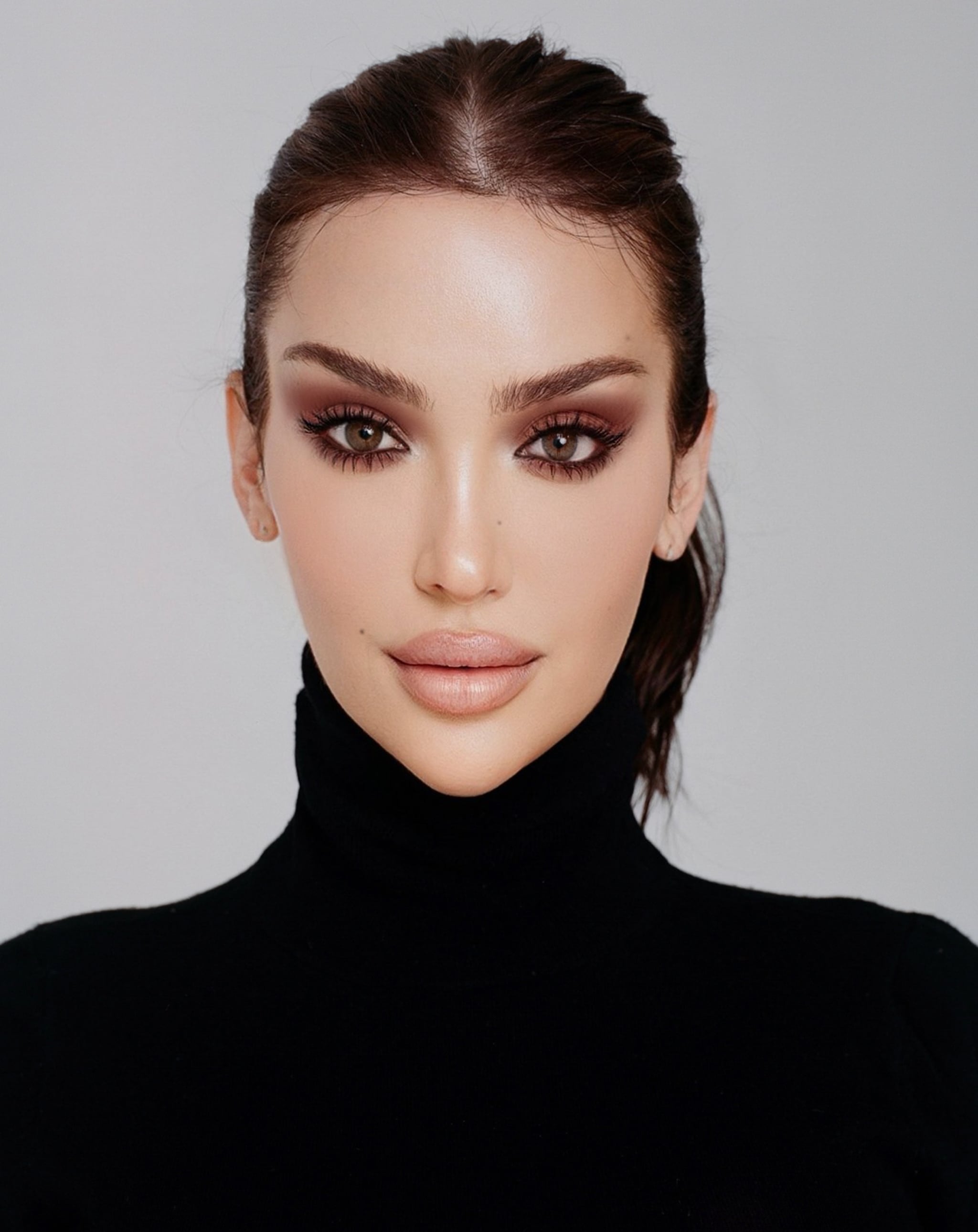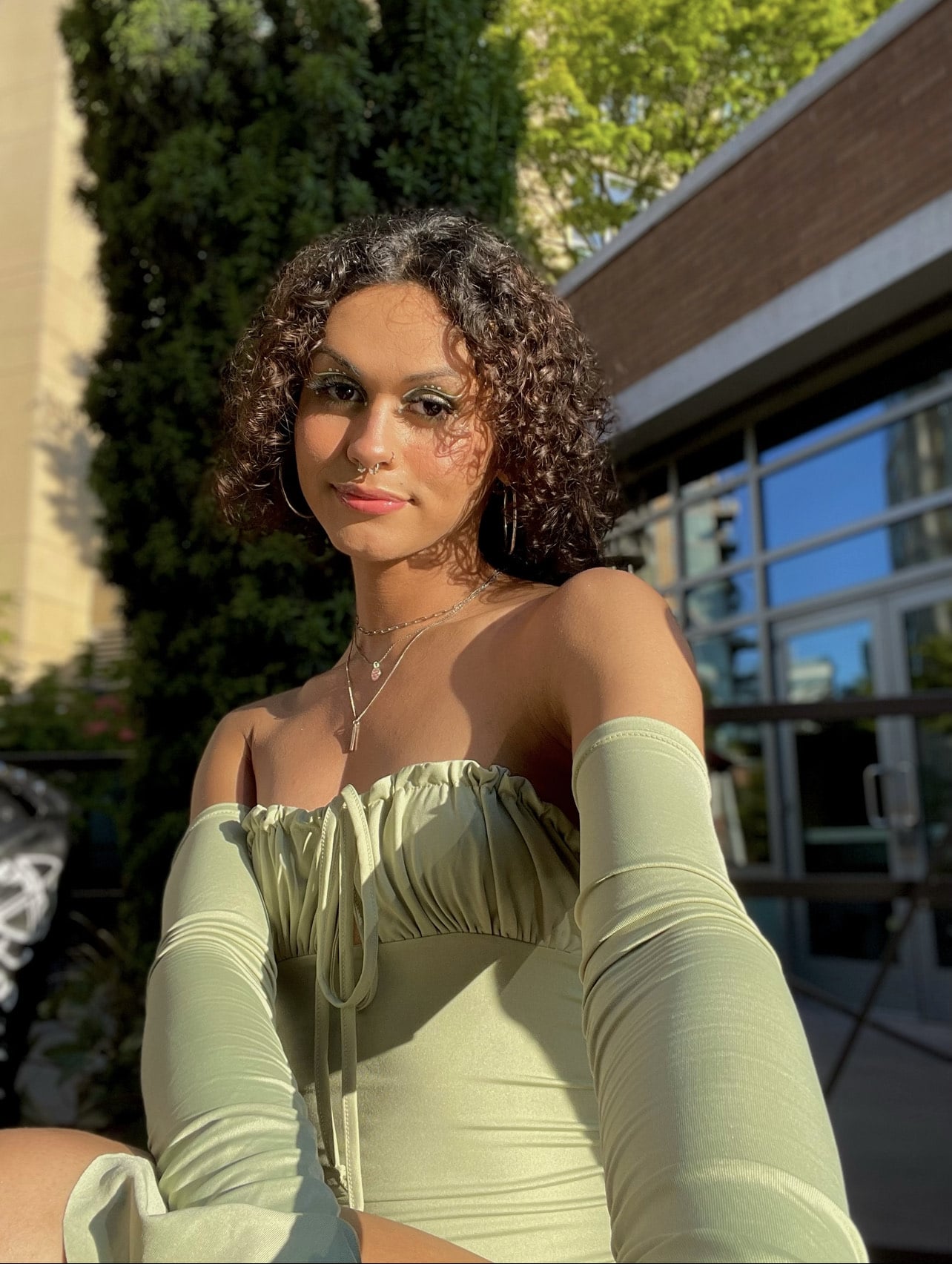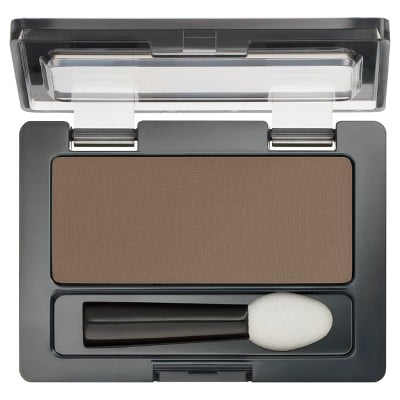Image Source: Angel Flores, Nykita Joy, and Mulani Jackson and Photo Illustration: Ava Cruz
Like many teenagers, puberty for community activist and Roses Initiative national organizer Mulani Jackson was tumultuous. Alongside navigating the changes that come with figuring out who she was as a young adult, Jackson was trying to put a name to an identity she wasn’t even quite sure existed. “I knew I was different,” Jackson tells POPSUGAR. “I feel like I came out 10,000 times. But it wasn’t until I was 15 and met a [transgender] person for the first time that I was able to put a name to it.”
What came next was a series of decisions that Jackson says had to occur, for her own safety and well-being. “After seeing Laverne Cox on [the cover of] Time magazine, I saw myself. Once I saw what was truly possible, I said, ‘Oh, you know what? I can do this.'” Jackson then moved out on her own and began living life on her terms as a proud trans woman. Throughout every experience, Jackson had a constant companion: her love of beauty.
“I really enjoyed that ’90s girl’s aesthetics. People like Nia Long and Gabrielle Union inspired me,” Jackson says. “On one hand, they always had this very soft, natural quality about the way that they looked, which I felt like wasn’t my reality when I first started transitioning. On the other hand, I also really loved the glamorous trans girls that I would encounter.” This duality would later help Jackson craft her own beauty narrative, which she says now lives on a spectrum. “My vision of beauty does change often,” Jackson says. “Sometimes I feel like I can conquer the world natural today. Other days, I think I might need full glam to go out today. What I’ve come to realize over the years is that both are OK.”
For Jackson and countless other trans women, beauty has provided a well of inspiration that has allowed them to find themselves and express their identities. For women like Nykita Joy, beauty was a bridge to fixing her relationship with her mother, who has since passed away. For others, like Angel Flores, it serves as a bullhorn for people to live authentically as themselves. Ahead, all three women speak with POPSUGAR about how beauty has played a role in their lives as women, as well as how it has helped them to weather relationships with themselves and those important to them.
Nykita Joy
Image Source: Instagram user neoitgirl
For model, makeup artist, and content creator Nykita Joy, beauty both caused a rift between her and her mother and subsequently brought them back together.
“For the 28 years that I knew my mother, she always looked the same,” Joy tells POPSUGAR. “She had the same haircut, wore the same makeup, and used the same five beauty products — two of which are the Maybelline Full ‘N Soft mascara ($10) and the Made For Mocha eyeshadow ($4). These were the exact products that I would use when I snuck into her bathroom cabinet and would secretly put some on.”
This process was sacred for Joy, as she could finally see herself for who she wanted to be. But it also needed to be done in hiding. “I would look at myself in the mirror and I’d be like, ‘Wow, you are stunning, girl.’ Then I would wash it off before my mom got home.” This would go on for years, with Joy getting more and more creative with the way she approached her love of beauty. “I did everything in private. I would lock myself in the bathroom, complaining of stomach pains for three hours, but really I was just in there beating my face with whatever product that I could get my hands on.”
This practice led to Joy “double dressing,” or wearing one outfit when she left home and changing into another when she got to school — only to revert back to her original clothes when it was time to go home. College is when she’d had enough. Joy dropped out of school. When forced to get a job, she got one at a makeup counter. “When my mom saw me as this beauty savant and she saw how passionate I was about beauty, that’s when she really met me for the first time — as Nykita,” Joy says.
This job was what allowed Joy and her mother to bond again. So instead of her mother teaching her about beauty, as is often the standard for cis women growing up, Joy experienced the opposite. “I got to hold her hand, take something that I loved — something that saved my life and that I have a deep reverence and respect for — and finally share it with her.”
Imnotcryingimnotcryingimnotcrying #skincare #haul #beauty #asmr @Dr. Dennis Gross @Dr.Jart+ North America @urban decay @Drunk Elephant @Fresh Beauty @Caudalie @AMOREPACIFIC US @Supergoop @Kate Somerville Skincare
In the following years, Joy’s mother would make the hour-long journey to shop at the Sephora store that her daughter worked at. When she passed away, the beauty products that they bonded over became what Joy used to remember her mother. In a series of TikTok videos titled “Skincare I’d Buy My Dead Mother,” Joy revealed various beauty products she bought for her mother over the years — some of which, she noticed before crying, had the detailed instructions for use that she’d given her mother written on the packaging.
“Beauty was something that ended up bringing us together in a very sweet way that I think is really unique,” Joy says. “I’m really glad that I got to have those experiences.”
Angel Flores
Image Source: Instagram user angelxfloress
Angel Flores realized that she was trans during a particularly isolating time: the national COVID lockdown. “During quarantine, I spent a lot of time by myself in my room,” Flores tells POPSUGAR. “A lot of times, I’d get into my own head, and no matter how many thoughts I had to wade through, my mind always went to one thing: the fact that something felt ‘missing’ inside me.” Eventually, after going back and forth trying to discover who she was, Flores had what she describes as a “happy mental breakdown.” “One day, I was just sitting at an old job, and out of nowhere, something clicked. I was like, ‘Holy crap, this is it. This is how I want to live my life. This is what the missing piece of me was.'”
Since then, Flores has been living fully in her truth as a trans woman, but this journey has not been without hardship. “A lot of the issues I face even today have to do with my ability to ‘pass,'” she says. “To society, if you’re going to transition, they want you to fully go through with the whole thing and medically transition to a male or female. But to me, that’s never been what transitioning has been about. It was more so just being who I am on the inside and expressing it on the outside.”
That tension between figuring out whether or not she was “passable” led Flores to explore an area that she was already a big fan of: beauty. “Watching my mom do her makeup every day for work is my earliest beauty memory,” she says. “I would sit there and just be mesmerized by her precision and all the details involved. I loved that she got to decide how she wanted to be perceived in the world every day.”
Today, beauty for Flores is all about choice. “Beauty has played a major role in the way that I choose to express myself,” Flores muses. “It influences how I feel about myself. I get to control the narrative surrounding whether or not I’m ‘passable’ just by the way I choose to express myself.” Makeup, she says, allows her to step outside the bubble that society deems appropriate. Instead, doing her makeup and flexing her creativity allow her to “do things [her] own way and take [her] transition into her own hands.” For Flores, beauty underscores the fact that there is nothing more gorgeous than the power of choice — and she plans to use this power to show the Latinx community and beyond that there is strength in being authentically yourself.
Mulani Jackson
Image Source: Instagram user mulanijackson
After her best friend died by suicide, Mulani Jackson decided to transition. “Watching someone close to me — who didn’t have that support from their family as a gender-nonconforming person — and seeing how it so deeply affected them, was my wakeup call,” Jackson says. “I decided that life is short, and if I’m going to die, I’d rather die living in my truth.”
But living in her truth as a woman meant unpacking a lot of the verbiage surrounding beauty that Jackson heard growing up — particularly when it came to natural hair. “The stuff I would hear my family say definitely affected the way I went about my transition,” she says. “My sisters had quintessential African American features and had kinkier hair growing up. Hearing them get told ‘your hair is so hard to manage’ or ‘that sh*t is so nappy’ would make me feel completely out of place because I’m like, ‘I know these people look better than me, but they’re not getting the love that they deserve because of their features and their skin complexion.’ It was extremely jarring to come to terms with as I thought about how I wanted to be perceived.”
As she’s continued on her journey and drawn inspiration from the icons she grew up watching on TV, Jackson has taken time to understand her own biases. As a result, it’s broadened the scope of the role that beauty plays in her life. “For so long, I was wrapping my worth and my ability to assimilate into society into how well I could beat my face and slay away,” she says. “I let the glamorous makeup and hair dictate how much people should value and respect me — so much so, I would let people misgender me if I didn’t feel like I performed well enough that day. But now that I can truly and authentically say that I love myself, the hair and the makeup are no longer my defining characteristics. Instead, beauty now plays a supporting role for me. I know I’m beautiful with or without the glamour, and that is truly the only thing that matters to me now.”
Source: Read Full Article













